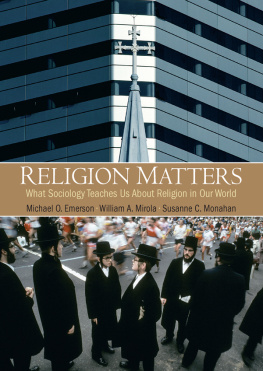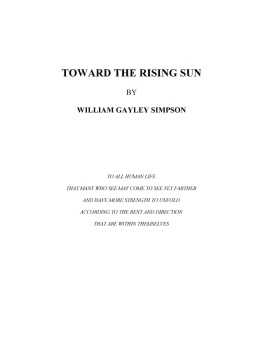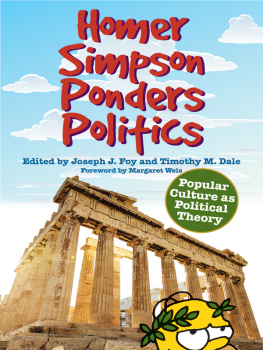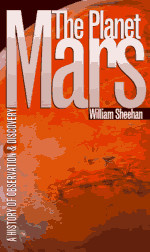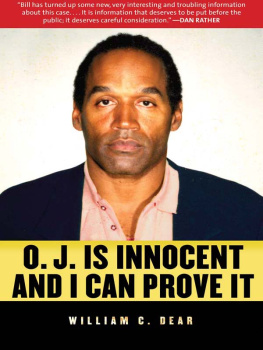...THE...
Man From Mars
HIS MORALS, POLITICS
AND RELIGION
BY
WILLIAM SIMPSON
THIRD EDITION
Revised and Enlarged by an Extended Preface and a
Chapter on Woman Suffrage
Press of
E. D. Beattie, 207 Sacramento St.
San Francisco
Copyright, 1900, by the Author.
TO THE MEMORY
OF
JAMES LICK
who, by his munificent bequests to
SCIENCE, INDUSTRY, CHARITY AND EDUCATION
has indicated in the manner of their
disposal, that humanity, wisdom, and enlightenment, arising
out of the convictions of modern thought, which holds these,
his beneficiaries to be the noblest and divinest pursuits of
mankind, and the only possible agencies in the betterment of
society.
This Book is reverently inscribed
By the Author .
PREFACE TO THIRD EDITION.
Any one advanced in life who has enjoyed opportunities of knowledge derived from association with men and books, and who has an inclination to reach the bottom of things by his own independent thought, is apt to arrive at conclusions regarding the world and society very different from those which had been early impressed upon him by his superiors and teachers. From a suspicion, at first reluctantly accepted, but finally confirmed beyond a doubt, he finds that he has been deceived in many things. The discovery arouses no indignation because he knows that his early instructors were in most cases the victims of misdirection themselves, and are therefore not to be held accountable for the promulgation of errors which they had mistaken for truths. His self-emancipation has so filled his mind with a better hope for the future of the world, and a higher opinion of his fellow men, that the delight and satisfaction of the discovery overcomes every sentiment except pity for those who had been leading him astray, and if the feeling of condemnation or censure comes to his mind at all, it is only for those few who live and thrive upon those delusions having their origin in the past, and whose chief purpose in life is to keep them alive and to bolster them up among the multitude.
In the new light that has come to him, the world and society have been transformed to his view and understanding. He discovers goodness in many places where his teachers had denied its existence, and its definition has become so changed, under his broader vision, that humanity seems teeming with it everywhere, and is ruled by it, and those departments of it most affecting society he observes to be increasing, and that instead of like an exotic in uncongenial soil, hard to be retained by mankind, it is perpetuated and cherished by natural human impulses. He finds, also, that the sum of badness in the world has been greatly exaggerated by his teachers, and that those branches of it most interfering with the welfare of society are gradually being lessened, and are likely to work out their extinction by the penalties of public disapproval. These convictions make the world seem a brighter and better dwelling place. They reveal to him the possibilities of its future, and tend to divert his higher aims from the obscure paths where tradition had been leading them, into more fruitful channels. The truth will have at last dawned upon him, bearing evidences in this age that none but the unenlightened can doubt, that superstition, during many of the centuries past, has belittled the world, and has discouraged humanity in improving it, under the mistaken assumption of the worlds small comparative importance in the great outcome; the circumstantial particulars, of which, it pretends to hold by divine revelation. Having rid himself of these beliefs by a process of reasoning, and the assistance of the available knowledge of his time, he arrives at the conclusion that the best work of humanity is not, altogether that taught by the creeds, and that its most divinely inspired motives are those which tend to increase the knowledge of worldly things, those which add to the sum of goodness in society by exhibiting its practical effect toward happiness, and those also which assist in the great end of equalizing the burdens and enjoyments of life among all.
Having these conclusions firmly established in his mind, and the undeserved reverence from early training removed, he becomes especially fitted to examine these old beliefs, and to pass judgment upon them, without that taint of blind devotional fervor which the unremitted teaching of many centuries has rendered current in the world. He observes of these old beliefs, that during their supremacy, when their control of society was complete and unquestioned, the material progress of mankind was least, without any compensating condition to make up for the darkness, and dead mental activity that had fallen upon it; except that apparent hypnotic influence from the doctrines taught, which made men careless of their miseries, and indifferent to the things of the earth. He observes, further, of these old beliefs, that as modern knowledge reduces their hold of authority among men, the world improves as it never did before. Even charity, kindness, and good will to men, adopted, and long taught as an inseparable part of them, multiply more rapidly as their weight in the management of human affairs grow less. From these well attested facts he arrives at the conviction that those religious societies, founded upon, and which have for centuries labored to perpetuate these beliefs, either are not possessed with all the elements of human progress, or, that having many of such elements, they have others of such neutralizing and retarding effect as to render the first futile for such a purpose. That the latter is the case, every year added to his experience of life removes the doubt, and explains to his understanding why the religious societies of the world have failed in any great degree to advance the material and intellectual condition of mankind.
With a moral code, every provision of which plainly indicates the method of a better social state, these religious societies have indissolubly associated in their teachings certain doctrinal beliefs, originating in a semi-barbarous age, and laden with its superstitions, with that fatal assumption of divine authority which demands their acceptance every where and for all time. Beliefs of such unbending rigidity, impossible adaption or amendment, and intolerance of dissent, on account of their pretended sacred character, that the world has been kept in a turmoil discussing them since their introduction, and the more salutary lessons of morality and spiritual hope have been outranked and submerged by these vain and profitless discussions. These beautiful and attractive lessons of love, kindness, and charity, exemplified and taught through a personality, whose gift of genius was to see, above all other men, the needs of humanity, have attracted men and women into these religious societies as the hungry are attracted by stores of food. Once within their lines, and imbued with the doctrines there found, they see but little abroad in the outside world but the evil spirit of Sheol. To them, its shadow rests upon much of the business of life, and with increased obscurity, upon many of its pleasures. It even shows to them among those humanities which are without their direction and cue. It is only however among the many who openly deny their doctrines and authority that the evil spirit is seen by them in all its hideous and malevolent personality, and their especial mission is to give battle in that direction. Between he who doubts, no matter how respectfully, and these religious societies, are drawn their lines of kindness and charity, and with their sermons of love, and their protestations of good will to mankind fresh upon them, they are at any time, transformed, so far as their relations with a doubter are concerned, into a band of hostile and relentless savages, with inflictions of punishment, measured in degree by surrounding enlightenment, from the actual barbaric torture of the savage, to mere social ostracism and avoidance.





